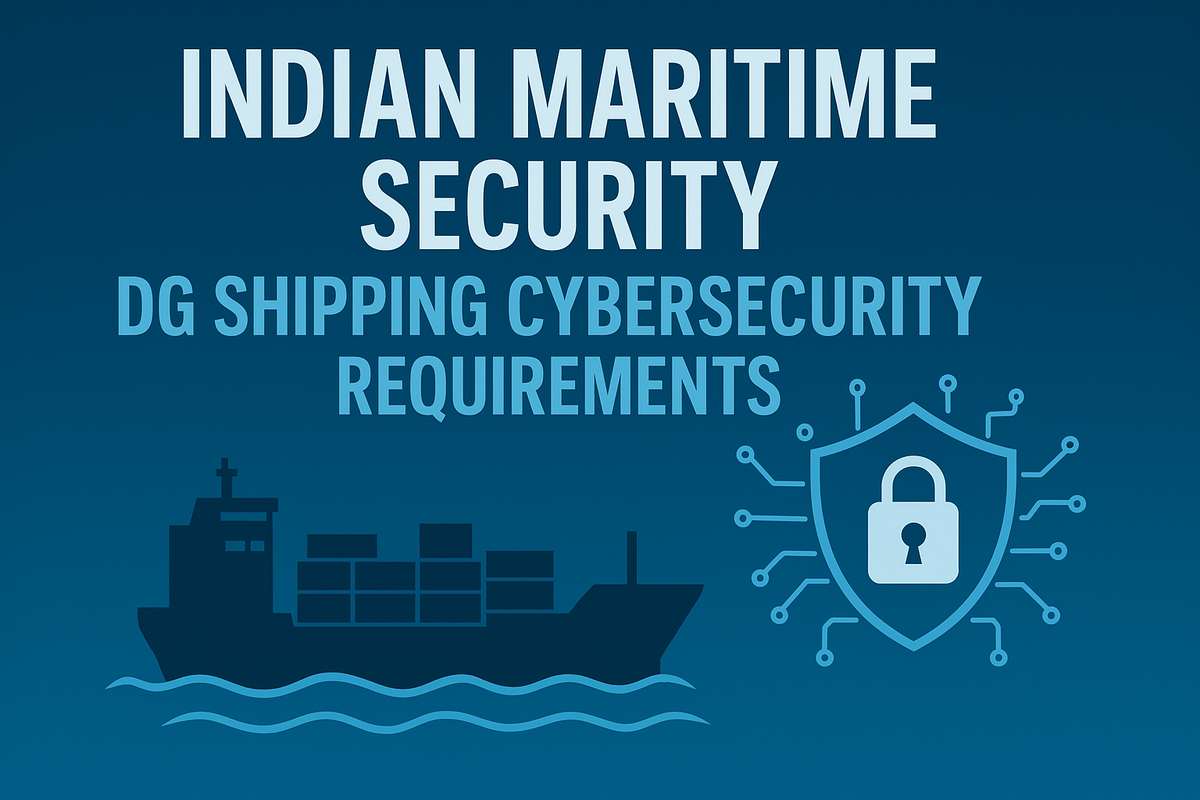Indian Maritime Security: DG Shipping Cybersecurity Requirements

Introduction
India, with a coastline spanning 7,500 km and over 200 ports, relies heavily on maritime trade—95% of trade by volume and 70% by value moves by sea. As shipping operations grow more digitized, cyber risks threaten operational continuity, cargo safety, environmental protection, and even national security. Incidents globally have shown that malware, ransomware, and targeted attacks can halt vessels, manipulate cargo systems, or compromise navigation and communications. Consequently, robust regulatory measures are now imperative for Indian shipping.
Global Maritime Cybersecurity Context
The International Maritime Organization (IMO) mandates that cyber risks—across IT and OT systems—be addressed in Safety Management Systems (SMS), under IMO Resolution MSC.428(98), effective from January 1, 2021. International guidelines, such as those from the International Association of Classification Societies (IACS) and the IEC 62443 OT security standard, require end-to-end protection covering equipment identification, network segmentation, threat detection, and response plans. These frameworks inform India’s domestic policies for fleet and port safety.
The Role of DG Shipping in Cybersecurity
Evolution of Directives
- Initial Steps: Following IMO’s guidance, the DG Shipping began issuing comprehensive circulars mandating cyber risk mitigation measures for all Indian flag vessels.
- Key Milestones:
- From January 2018, new Document of Compliance (DOC) applicants were required to demonstrate cyber-risk readiness.
- By January 2021, all existing DOC holders had to comply with IMO-aligned cybersecurity controls.
Scope of Coverage
DG Shipping regulations extend beyond international trading vessels:
- Covers vessels below 500 GT, non-international traders, and ‘River Sea Vessels’ (RSVs).
- Links Ship Security Plans (SSP), ISPS compliance, and ISM Code cyber mandates.
DG Shipping Cybersecurity Requirements: Policy & Procedural Framework
1. Risk Assessment
All shipping companies must conduct systematic Maritime Cyber Security Risk Assessments:
- Identify critical assets across IT and OT systems (e.g., navigation, propulsion, cargo management).
- List potential threats and vulnerabilities, including supplier and third-party exposures.
- Evaluate risk exposure; prioritize based on impact to safety, environment, and commerce.
2. Mitigation & Controls
Key controls outlined by DG Shipping include:
- Robust network security (segmentation, firewalls, secure ship-shore connections)
- Access control policies and user privilege management
- Malware prevention, real-time monitoring, and incident detection
- Incident management and contingency planning, including roles and communication protocols
3. Operational Requirements
- Regular software patching and secure system configuration
- Controlled use of removable media (USBs, portable devices)
- Controls for remote access and ship-to-shore communications
- Strong password policies and credential management
4. Crew Training and Awareness
- Mandatory cybersecurity awareness programs for all crew members
- Regular drills simulating cyber incidents (e.g., navigation failure, communication blackout)
- Dedicated specialist roles—such as Cyber Security Officers—onboard major vessels.
5. Certification and Compliance Monitoring
- Ships must maintain compliance records, with audits (internal/external) aligning with both ISM and ISPS codes.
- Non-compliance may result in penalties or withdrawal of certification.
- Ongoing reforms bring Indian requirements closely in line with evolving international mandates.
Interplay with International Standards: ISPS, ISM, IACS URs & IEC 62443
DG Shipping’s circulars emphasize:
- Integrating cyber risk into existing Safety Management Systems.
- Ship Security Plans referencing and embedding cyber procedures, so updates don’t require repeated regulatory approval.
- Adherence to new IACS Unified Requirements (E26, E27) for newbuilds post-July 2024, covering both IT and OT system safety.
Challenges in Indian Maritime Cybersecurity Adoption
- Legacy Infrastructure: Many Indian flag vessels (~500 GT and below) are only now adapting to digitalization, requiring upgrades to meet minimum protection baselines.
- Supply Chain Risk: Third-party vendors, especially for OT components, may not adhere to uniform security standards, heightening vendor risk.
- Awareness Gaps: Not all crew and operators have been trained in modern cyber hygiene practices; skill gaps persist, especially for supply chain and port interfaces.
- Funding Constraints: Fleet owners, particularly smaller operators, face budget constraints for lifting security posture to new regulatory levels.
Notable Incidents and Case Studies
- Global precedents include port shut-downs and ship navigation manipulation—India’s preparedness is periodically tested in simulations and, occasionally, real incidents.
- Evolving threat intelligence sharing underpins India’s response planning.
Enforcement and Regulatory Ecosystem
- National Maritime Cybersecurity Framework: Often advocated by industry experts, such a framework would align DG Shipping rules and CERT-In guidance, strengthen penalties, and promote real-time threat intelligence.
- Indian Port Risk-Assessment Framework: Every port is expected to conduct periodic security assessments, report risk status to DG Shipping, and maintain updated recovery and business continuity plans.
Conclusion
With maritime trade as India’s economic lifeline, DG Shipping’s cybersecurity requirements mark a crucial evolution in national security policy. While compliance remains a work in progress, synergizing with global standards, sustaining cyber awareness, and integrating advanced technology will secure Indian seas for the future.
Take the Next Step with CodeSecure Solutions
Cyber threats are growing more sophisticated every day. With a trusted partner by your side, you can safeguard your business while focusing on what truly matters—growth and innovation.
At CodeSecure Solutions, we deliver comprehensive cybersecurity services in Chennai, uniquely tailored for startups, SMEs, and enterprises:
- Vulnerability Assessment & Penetration Testing (VAPT)
- Network Security Solutions
- Compliance Support (ISO 27001, PCI-DSS, HIPAA, DPDP Act, GDPR)
- Cloud & Endpoint Protection
- Security Awareness Training
No matter your industry or size, CodeSecure customizes solutions to fit your needs—ensuring your data, reputation, and operations remain secure.
Ready to Strengthen Your Defenses?
- 📞 Call: +91 73584 63582
- ✉️ Email: [email protected]
- 🌐 Visit: www.codesecure.in
Stay secure. Stay informed. Choose CodeSecure Solutions—your partner in cyber resilience.
